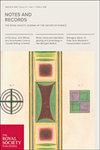John Wallis and the Catholics: confessional and theological antagonism in Wallis's mathematics and philosophy
IF 0.6
3区 哲学
Q3 HISTORY & PHILOSOPHY OF SCIENCE
Notes and Records-The Royal Society Journal of the History of Science
Pub Date : 2018-08-22
DOI:10.1098/rsnr.2018.0020
引用次数: 2
Abstract
Like many of his contemporaries, the mathematician and Anglican minister John Wallis (1616–1703) repeatedly made disparaging remarks about Roman Catholics, particularly the pope and the Jesuits. This paper considers how Wallis's anti-Catholic attitude affected his reception of ideas about nature and mathematics. A well-known example is his resistance to the adoption of the Gregorian calendar in England, which he claimed would be an implicit acknowledgement of the pope's authority. This was not an isolated case in Wallis's career. For instance, the same attitude is evident in his earliest publication, Truth Tried (1643), wherein he adopts a position on the metaphysics of time and place that explicitly opposes the doctrine of transubstantiation. In addition, anti-Catholicism made Wallis more receptive to subjects that otherwise did not interest him, namely numerology and biblical prophecy. This helps to explain his decision to publish a Latin translation of Francis Potter's Interpretation of the Number 666 (1642), which Wallis seems to have appreciated mainly because of its argument that the pope is the Antichrist. These cases offer insights about Wallis's motivations as a natural philosopher and mathematician, and how they relate to anti-Catholicism in early modern English science more generally.约翰·瓦利斯与天主教徒:瓦利斯数学哲学中的忏悔与神学对立
与许多同时代的人一样,数学家兼圣公会牧师约翰·瓦利斯(1616-1703)多次对罗马天主教徒,特别是教皇和耶稣会士发表贬损言论。本文探讨了瓦利斯的反天主教态度对他接受自然和数学思想的影响。一个著名的例子是他反对英国采用公历,他声称这是对教皇权威的含蓄承认。在瓦利斯的职业生涯中,这并不是一个孤立的案例。例如,同样的态度在他最早的出版物《真理审判》(1643)中表现得很明显,在该书中,他对时间和地点的形而上学采取了明确反对变质学说的立场。此外,反天主教使瓦利斯更容易接受他不感兴趣的学科,即命理学和圣经预言。这有助于解释他决定出版弗朗西斯·波特(Francis Potter)的《数字666的解释》(1642年)的拉丁译本,瓦利斯似乎很欣赏这本书,主要是因为它认为教皇是反基督者。这些案例提供了关于瓦利斯作为一名自然哲学家和数学家的动机的见解,以及它们如何与早期现代英国科学中的反天主教联系起来。
本文章由计算机程序翻译,如有差异,请以英文原文为准。
求助全文
约1分钟内获得全文
求助全文
来源期刊
CiteScore
1.50
自引率
0.00%
发文量
45
审稿时长
>12 weeks
期刊介绍:
Notes and Records is an international journal which publishes original research in the history of science, technology and medicine.
In addition to publishing peer-reviewed research articles in all areas of the history of science, technology and medicine, Notes and Records welcomes other forms of contribution including: research notes elucidating recent archival discoveries (in the collections of the Royal Society and elsewhere); news of research projects and online and other resources of interest to historians; essay reviews, on material relating primarily to the history of the Royal Society; and recollections or autobiographical accounts written by Fellows and others recording important moments in science from the recent past.

 求助内容:
求助内容: 应助结果提醒方式:
应助结果提醒方式:


